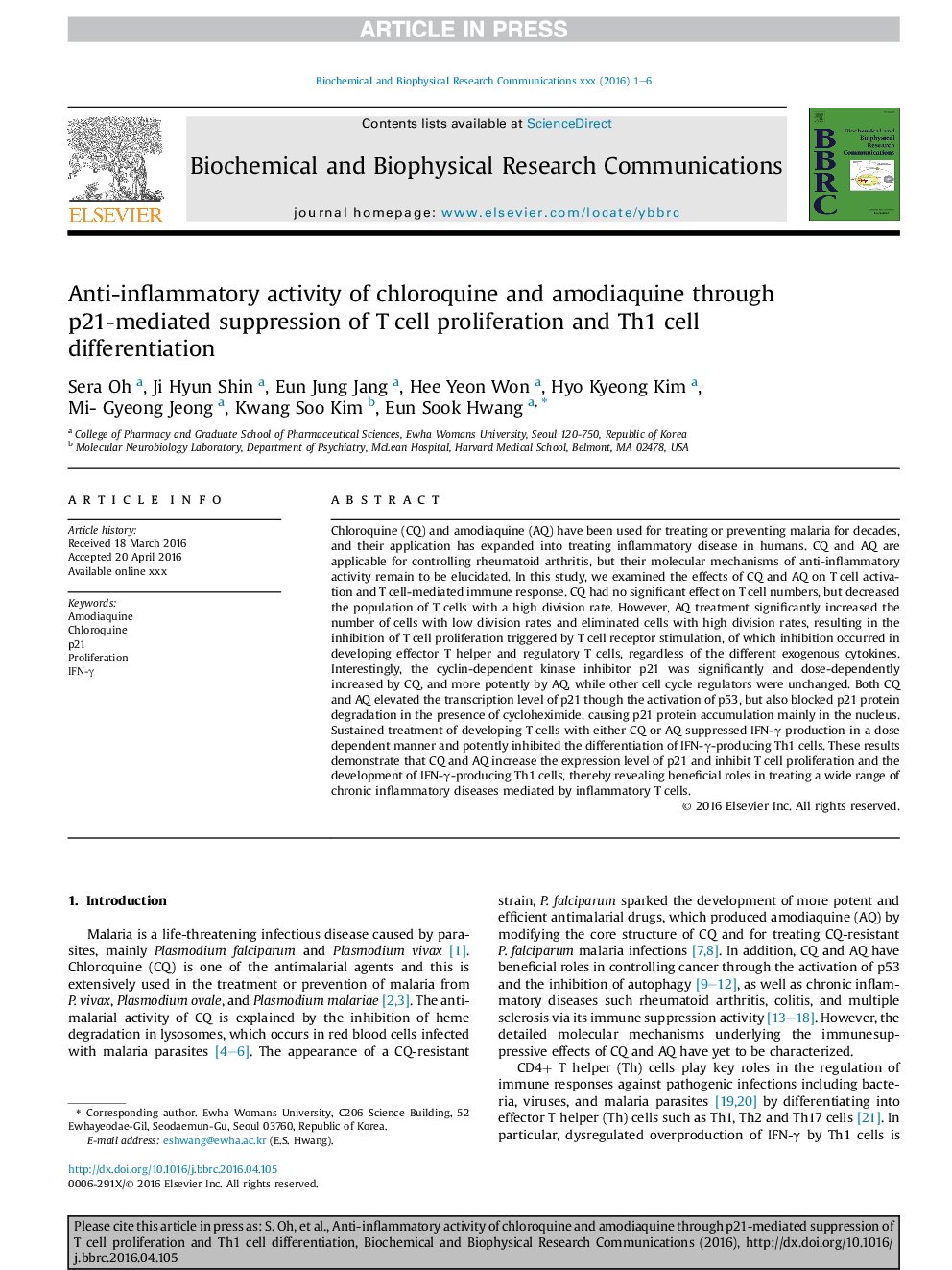| کد مقاله | کد نشریه | سال انتشار | مقاله انگلیسی | نسخه تمام متن |
|---|---|---|---|---|
| 10748270 | 1050269 | 2016 | 6 صفحه PDF | دانلود رایگان |
عنوان انگلیسی مقاله ISI
Anti-inflammatory activity of chloroquine and amodiaquine through p21-mediated suppression of T cell proliferation and Th1 cell differentiation
دانلود مقاله + سفارش ترجمه
دانلود مقاله ISI انگلیسی
رایگان برای ایرانیان
موضوعات مرتبط
علوم زیستی و بیوفناوری
بیوشیمی، ژنتیک و زیست شناسی مولکولی
زیست شیمی
پیش نمایش صفحه اول مقاله

چکیده انگلیسی
Chloroquine (CQ) and amodiaquine (AQ) have been used for treating or preventing malaria for decades, and their application has expanded into treating inflammatory disease in humans. CQ and AQ are applicable for controlling rheumatoid arthritis, but their molecular mechanisms of anti-inflammatory activity remain to be elucidated. In this study, we examined the effects of CQ and AQ on T cell activation and T cell-mediated immune response. CQ had no significant effect on T cell numbers, but decreased the population of T cells with a high division rate. However, AQ treatment significantly increased the number of cells with low division rates and eliminated cells with high division rates, resulting in the inhibition of T cell proliferation triggered by T cell receptor stimulation, of which inhibition occurred in developing effector T helper and regulatory T cells, regardless of the different exogenous cytokines. Interestingly, the cyclin-dependent kinase inhibitor p21 was significantly and dose-dependently increased by CQ, and more potently by AQ, while other cell cycle regulators were unchanged. Both CQ and AQ elevated the transcription level of p21 though the activation of p53, but also blocked p21 protein degradation in the presence of cycloheximide, causing p21 protein accumulation mainly in the nucleus. Sustained treatment of developing T cells with either CQ or AQ suppressed IFN-γ production in a dose dependent manner and potently inhibited the differentiation of IFN-γ-producing Th1 cells. These results demonstrate that CQ and AQ increase the expression level of p21 and inhibit T cell proliferation and the development of IFN-γ-producing Th1 cells, thereby revealing beneficial roles in treating a wide range of chronic inflammatory diseases mediated by inflammatory T cells.
ناشر
Database: Elsevier - ScienceDirect (ساینس دایرکت)
Journal: Biochemical and Biophysical Research Communications - Volume 474, Issue 2, 27 May 2016, Pages 345-350
Journal: Biochemical and Biophysical Research Communications - Volume 474, Issue 2, 27 May 2016, Pages 345-350
نویسندگان
Sera Oh, Ji Hyun Shin, Eun Jung Jang, Hee Yeon Won, Hyo Kyeong Kim, Mi- Gyeong Jeong, Kwang Soo Kim, Eun Sook Hwang,